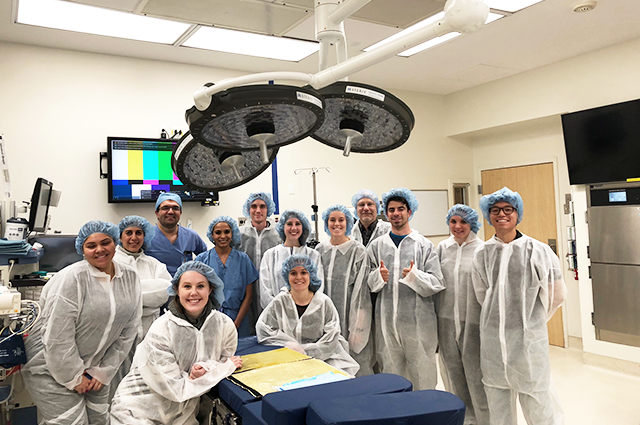Designing for health

By Manisha Aggarwal-Schifellite
In a new course piloted this semester, Tufts students got a hands-on education in the world of medical device design. Led by Professor of the Practice Michael Wiklund of the Department of Mechanical Engineering, students in Medical Fundamentals (ENP 109) went beyond the classroom to learn about the role of medical devices in research and medical practice. Alexandria Trombley, a master's student in Human Factors, served as course grader and helped to arrange some of the field trips.
During the semester, students attended regular lectures and took field trips to labs and clinics, where guest lecturers taught from their own experiences and knowledge about healthcare research and operations that use new technologies and inventions. “I believe that the mix of classroom and field-based education has invigorated and inspired the students,” Wiklund says, citing trips to Tufts’ gross anatomy lab and a Boston-based dialysis clinic. “It really brought the classroom material and readings into vivid focus.”
Medical Fundamentals is offered as part of the Human Factors Engineering (HFE) program at Tufts. “Human factors engineering is all about matching systems and technology to the capabilities, needs, and preferences of human beings,” Wiklund explains. The Tufts program offers B.S. and M.S. students the opportunity to learn about the science of design from renowned faculty with decades of experience in the field, and the undergraduate program was one of the first of its kind in the United States.
To understand the depth and breadth of devices used in medical work, students in the Medical Fundamentals course have had the chance this semester to learn from professionals including nephrologists, urologists, radiology technicians, surgeons specializing in laparoscopic, robot-assisted, and endovascular procedures, and more. Wiklund’s own career in the field has also been instructive to the course design and implementation. He is the general manager of the human factors engineering practice at Underwriters Laboratories (UL), which employs over 50 HFE specialists working on three continents, including Tufts alumni.
As a faculty member at Tufts, Wiklund combines his practical expertise with classroom pedagogy, offering a glimpse into the world of work for students looking to enter the medical industry. For Wiklund, getting out of the classroom is crucial. “Regarding talks with medical practitioners, there is no substitute,” he says. “To make products ‘user friendly,’ HFE specialists first need to learn about the needs and preference of the people who will operate the products.”
Department:
Mechanical Engineering